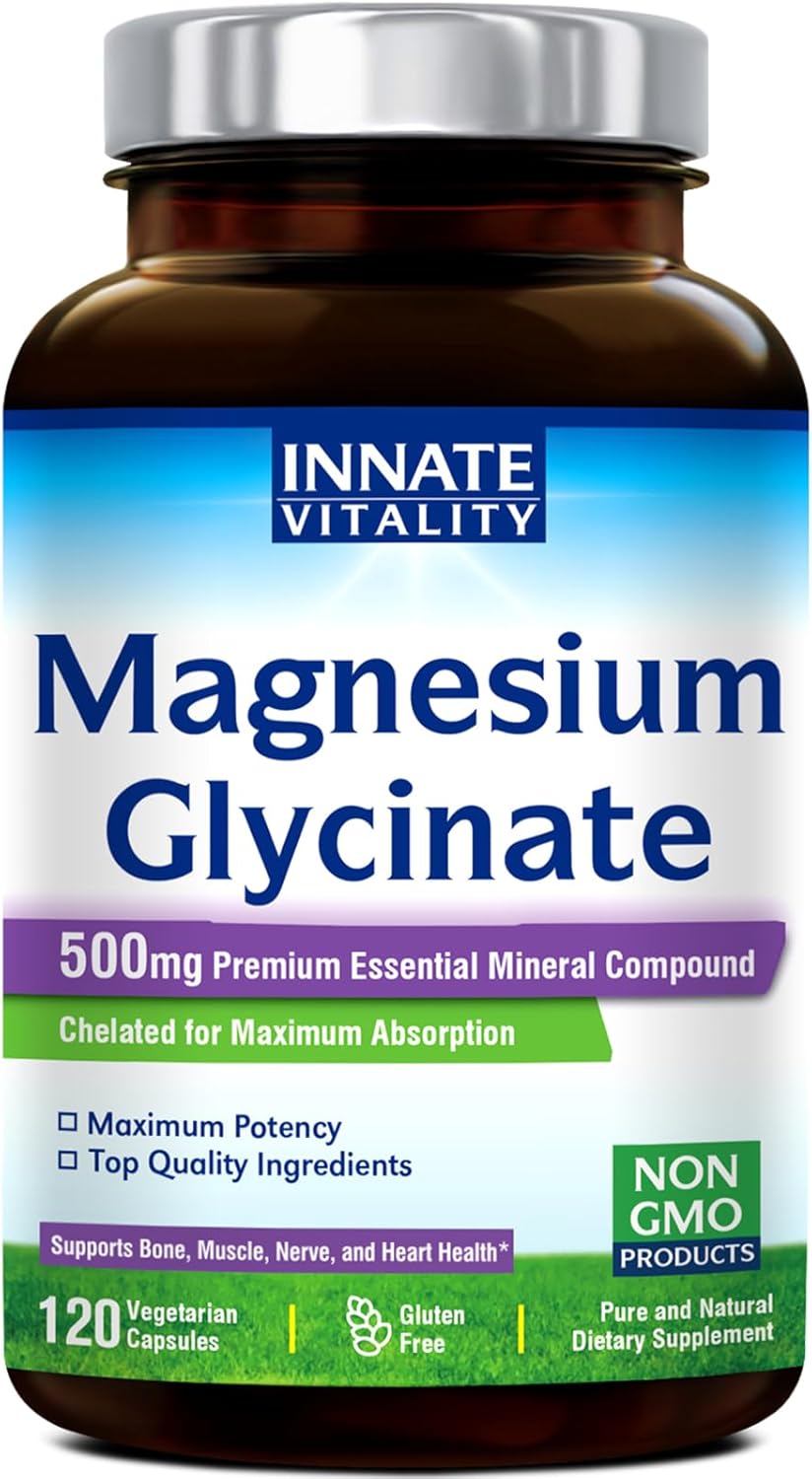Magnesium is one of the essential minerals your body needs for proper functioning, yet many individuals unknowingly fall short of meeting the daily recommended intake.
Despite its significance, symptoms of magnesium deficiency are often subtle because the kidneys regulate magnesium excretion to maintain balance.
However, chronic inadequacy can lead to various health issues, making supplementation a viable option for those who cannot achieve optimal levels through diet alone.
Among the available supplements, magnesium glycinate stands out for its superior absorption and tolerability.
This blog explores the benefits, uses, and risks of magnesium glycinate, based on an in-depth analysis of two authoritative articles on the topic. Let’s dive into why this form of magnesium has become a go-to choice for many.
What is Magnesium Glycinate?
Magnesium glycinate, also known as magnesium bisglycinate or diglycinate, is a chelated form of magnesium. It is created by bonding elemental magnesium with glycine, an amino acid.
This combination enhances its bioavailability, allowing for more efficient absorption in the small intestine compared to other magnesium types like magnesium oxide or citrate.
The unique properties of magnesium glycinate make it particularly appealing. Unlike other forms, it is less likely to cause digestive discomfort such as diarrhea, a common side effect associated with magnesium supplements.
This makes it suitable for individuals with sensitive digestive systems or those prone to gastrointestinal issues.
The Importance of Magnesium in the Body
Magnesium is a vital mineral involved in over 300 enzymatic reactions in the body. Its roles include:
- Regulating muscle and nerve function: Magnesium helps prevent muscle cramps, contractions, and nerve dysfunction.
- Maintaining blood sugar and blood pressure levels: It supports glucose metabolism and stabilizes blood pressure.
- Bone health: Magnesium contributes to bone density and reduces the risk of fractures.
- Protein synthesis and DNA production: It plays a crucial role in building proteins and maintaining genetic integrity.
Benefits of Magnesium Glycinate
1. Improved Bone Health
Magnesium glycinate enhances bone density, making it beneficial for individuals at risk of osteoporosis. Studies indicate that higher magnesium levels correlate with stronger bones and reduced fracture risks.
2. Blood Sugar Regulation
For individuals with type 2 diabetes or insulin resistance, magnesium glycinate can support glucose metabolism by reducing insulin resistance. This, in turn, may lower the risk of diabetes-related complications.
3. Cardiovascular Support
Magnesium is known to stabilize blood pressure and maintain regular heart rhythms, reducing the risk of hypertension, stroke, and heart disease. Magnesium glycinate’s high bioavailability makes it particularly effective in providing these cardiovascular benefits.
4. Migraine Prevention
Low magnesium levels are often associated with migraines. Supplementing with magnesium glycinate may help reduce the frequency and intensity of migraines.
5. Mental Health Benefits
Magnesium plays a role in serotonin production, a neurotransmitter linked to mood regulation. By enhancing serotonin levels, magnesium glycinate can help alleviate symptoms of anxiety and mild to moderate depression.
6. PMS Relief
Magnesium glycinate is effective in managing premenstrual syndrome (PMS) symptoms such as mood swings, cramps, and bloating. Its muscle-relaxing properties can ease menstrual pain as well.
7. Better Sleep Quality
While evidence is mixed, magnesium glycinate is often used to improve sleep by regulating neurotransmitters involved in relaxation and sleep cycles.
Natural Sources of Magnesium
While magnesium supplements are helpful, obtaining magnesium from dietary sources is ideal. Foods rich in magnesium include:
- Dark leafy greens: Spinach, kale, and Swiss chard.
- Nuts and seeds: Almonds, pumpkin seeds, chia seeds, and sesame seeds.
- Legumes: Lentils, black beans, and chickpeas.
- Whole grains: Brown rice, quinoa, and whole wheat.
- Fish: Halibut and mackerel.
- Fruits: Bananas, blackberries, and dried figs.
For those with dietary restrictions or poor absorption due to conditions like celiac disease or inflammatory bowel disease, magnesium glycinate supplements provide a reliable alternative.
Dosage Recommendations
The Recommended Dietary Allowance (RDA) for magnesium varies by age, sex, and life stage. Here’s a general guideline:
| Age | RDA for Males | RDA for Females |
|---|---|---|
| 14–18 years | 410 mg | 360 mg |
| 19–30 years | 400 mg | 310 mg |
| 31+ years | 420 mg | 320 mg |
Pregnant and lactating individuals may require higher amounts. It’s best to consult a healthcare professional for personalized recommendations.
Risks of Magnesium Deficiency
Approximately 50% of Americans have insufficient magnesium intake, which can lead to:
- Fatigue and weakness
- Muscle cramps and spasms
- Abnormal heart rhythms
- Nausea and vomiting
- Tingling sensations
Certain factors exacerbate magnesium deficiency, including alcohol use, poorly managed diabetes, and gastrointestinal disorders. If you suspect a deficiency, a doctor may recommend blood tests to confirm the diagnosis.
Potential Side Effects of Magnesium Glycinate
While magnesium glycinate is well-tolerated, excessive intake can cause:
- Nausea
- Abdominal discomfort
- Diarrhea
Severe magnesium toxicity, though rare, may result in:
- Irregular heartbeat
- Muscle weakness
- Low blood pressure
- Breathing difficulties
- Cardiac arrest
Individuals with kidney problems should exercise caution, as their ability to excrete excess magnesium may be impaired.
How to Safely Use Magnesium Glycinate
1. Choose High-Quality Supplements
Opt for supplements from reputable brands that provide clear information about elemental magnesium content.
2. Take with Food
Consuming magnesium glycinate with meals can enhance absorption and reduce the risk of stomach upset.
3. Consult a Healthcare Provider
Before starting any supplement, consult a healthcare professional, especially if you’re pregnant, nursing, or taking medications like antibiotics or bisphosphonates.
Is Magnesium Glycinate Right for You?
Magnesium glycinate is a versatile supplement with multiple health benefits, especially for individuals struggling with magnesium deficiency, high blood pressure, diabetes, or anxiety.
Its high bioavailability and gentle effect on the digestive system make it a preferred choice over other magnesium forms.
That said, supplementation should complement a balanced diet rich in natural magnesium sources. Consulting a healthcare professional ensures you’re taking the right dosage tailored to your needs.
Incorporating magnesium glycinate into your wellness routine could be a step toward improved health and vitality.
Whether for stronger bones, a healthier heart, or better sleep, this supplement is a powerhouse that deserves a place in your nutritional arsenal.

















